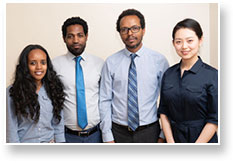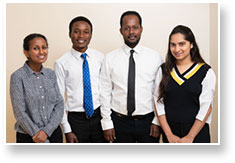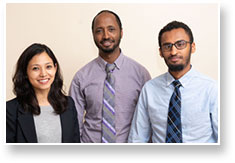
The best-performing team of Tsion Woge (Ethiopia), Molla Mekonnen (Ethiopia), Daniel Ayalew Belay (Ethiopia), and Haofang Dong (China)

Team 2: Birkti Gebremariam (Ethiopia), Thembo Harrison (Uganda), Endale Jiru (Ethiopia), Shreya Kothari (India)

Team 3: Sharmila Prajapati (Nepal), Kisi Fufa (Ethiopia), Henok Gelaw (Ethiopia)

Professor Anil Maheshwari; guest speaker Jim Cody, a retired Caterpillar executive; and Andrew Bargerstock
Three student teams from MUM’s MBA program recently participated in the Capsim Capstone online business simulation, a leading Chicago-based provider of business games. One of the teams achieved results better than 94 percent of the 1150 graduate-level teams worldwide. Team members included Tsion Woge, Molla Mekonnen, and Daniel Ayalew Belay, all from Ethiopia, and Haofang Dong from China.
According to Dr. Andrew Bargerstock, who uses the Capstone Simulation in his Enterprise Performance Management course, MUM’s MBA teams have participated in this online simulation since 2010. In all 20 incidents of MUM’s participation at least one MUM team has finished in the top 10th percentile.
During the course, students learn about Maharishi’s Five Qualities of the Executive Mind: comprehension, creativity, initiative, vigilance, and foresight. “Students are asked to select two specific activities from the simulation for each quality and describe how those activities have cultivated each of the five qualities,” said Dr. Bargerstock. “Students report their findings in an essay, which is a valuable reflection of their growing maturity in decision making.”
“From this simulation, I learned that creativity is a key skill in business,” said Haofang Dong. “All the groups start on an equal footing. What you do to run the business will make a different story. All aspects of running a business need creativity.”
“During the simulation I developed my level of vigilance,” said Molla Mekonnen. “As a team member, I was watchful about the competitors’ actions. Therefore, I was identifying our strengths and weaknesses in each round in each product segment and the opportunities and threats we would face in the coming rounds.”
Learning to work effectively in a team is also an essential skill the simulation cultivates. “We had to adopt certain principles such as: respect for one another, focusing on ideas not people, and data should lead the way,” said Daniel Ayalew Belay. “For example, the executive team members could come up with differing and, at times, conflicting decisions.”
Other high-performing universities in the top ten percent included University of Northern Iowa, The University of Texas, Ohio University, University of Washington, DePaul University, Brigham Young University, The Citadel, Georgia Institute of Technology, Royal Melbourne Institute of Technology, and Shanghai University of Finance and Economics.
